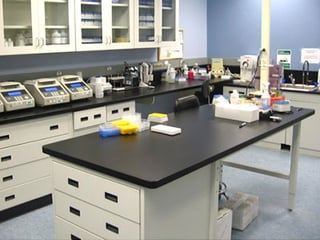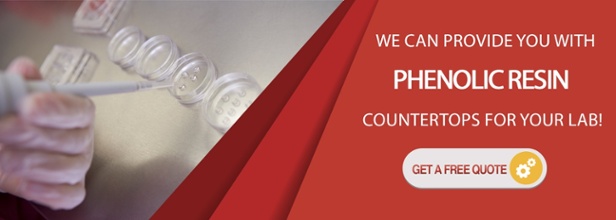Phenolic resins are being used in many applications these days. But one of the most important uses is for laboratory countertops. Let's take a look at why it is one of the top choices in the lab.
What Are Phenolic Resins?
 Phenolic resins are compounds that combine phenol and formaldehyde, creating large networks of permanently bonded molecules. Depending on the balance between phenol and formaldehyde and whether the catalyst used is an acid or a base, the phenol formaldehyde resin properties vary.
Phenolic resins are compounds that combine phenol and formaldehyde, creating large networks of permanently bonded molecules. Depending on the balance between phenol and formaldehyde and whether the catalyst used is an acid or a base, the phenol formaldehyde resin properties vary.
Using water and a base with excess formaldehyde creates a polymer called a resole. These resoles are often used with heat and pressure to create a strong bond between layers of plywood. The properties of phenol resins are especially prized in external plywood or plywood used in any environment exposed to water or harsh conditions.
The other major class of phenolic resin is called a novolak. This process uses excess phenol and an acid catalyst. The resulting thermoplastic is often ground into a powder, mixed with a filler and used in heated and pressurized molds. They are often used in heat resistant objects such as handles and knobs for appliances and cookware or electrical connectors.
These synthetic polymers were among the first commercially available resins, dating back as far as 1872.
Properties of Phenolic Resins
 Phenolic resins have excellent resistance to heat and chemicals, making them ideal for volatile environments. They are non-conductive and flame resistant, so they are a good choice for labs or any environments that require compliance with fire safety, smoke emission, combustion and toxicity standards.
Phenolic resins have excellent resistance to heat and chemicals, making them ideal for volatile environments. They are non-conductive and flame resistant, so they are a good choice for labs or any environments that require compliance with fire safety, smoke emission, combustion and toxicity standards.
In addition, phenol formaldehyde resin properties include good thermal insulation, low density and excellent durability. They are easy to mold into a variety of shapes and complex contours, making them adaptable to custom equipment or environments. Phenolic resins have even been adapted for use in 3D printers, further increasing their utility.
You will find phenolic resins commonly used in mine ventilation, offshore pipes, electronics, ballistics, aerospace, rail and mass transit systems as well as labs and other areas than require non-reactive, durable counters and tabletops.
Why You Should Select Lab Countertops made From Phenolic Resins
 If you are looking for lab countertops that hold up to impact and resist stress fractures, phenolic resin countertops may be a good choice. In addition to being impact and scratch resistant, phenolic resin countertops are highly resistant to bacteria and fungus. They are unaffected by corrosion and impervious to most chemicals. They look great in a lab because they are one solid, lightweight piece that can be made in almost any configuration and shaped to the required size.
If you are looking for lab countertops that hold up to impact and resist stress fractures, phenolic resin countertops may be a good choice. In addition to being impact and scratch resistant, phenolic resin countertops are highly resistant to bacteria and fungus. They are unaffected by corrosion and impervious to most chemicals. They look great in a lab because they are one solid, lightweight piece that can be made in almost any configuration and shaped to the required size.
Phenolic resin lab countertops can withstand continuous heat exposure up to 350°F, although they are not flame retardant and will eventually burn at high heat. But for a good, reasonably priced all around useful lab countertop, phenolic resin countertops may be an excellent choice.
Phenolic resin is not the only choice for lab countertops, and it may not be the best choice in your particular environment. For a complete analysis of the pros and cons of other lab countertop materials, check out our recent article on the pros and cons of the top 5 materials for your lab countertops. The post includes a discussion of the strengths, weaknesses and relative costs of other materials, including stainless steel and various laminates as well as other types of resins.
Your lab operations are critical to your business. And, everything in the lab needs to be chosen with an eye toward your unique environment as well as cost, but that doesn’t mean aesthetics don’t matter. Only you can decide on the right mix of cost and appearance, but we can help you choose the right materials for your lab countertops.


